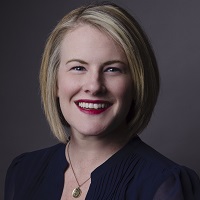Four Ways Women Can Take Control of Their Financial Health
Adjusting for life events, taking advantage of workplace benefits and preparing for caregiving can make a big difference in your financial future.


Profit and prosper with the best of Kiplinger's advice on investing, taxes, retirement, personal finance and much more. Delivered daily. Enter your email in the box and click Sign Me Up.
You are now subscribed
Your newsletter sign-up was successful
Want to add more newsletters?

Delivered daily
Kiplinger Today
Profit and prosper with the best of Kiplinger's advice on investing, taxes, retirement, personal finance and much more delivered daily. Smart money moves start here.

Sent five days a week
Kiplinger A Step Ahead
Get practical help to make better financial decisions in your everyday life, from spending to savings on top deals.

Delivered daily
Kiplinger Closing Bell
Get today's biggest financial and investing headlines delivered to your inbox every day the U.S. stock market is open.

Sent twice a week
Kiplinger Adviser Intel
Financial pros across the country share best practices and fresh tactics to preserve and grow your wealth.

Delivered weekly
Kiplinger Tax Tips
Trim your federal and state tax bills with practical tax-planning and tax-cutting strategies.

Sent twice a week
Kiplinger Retirement Tips
Your twice-a-week guide to planning and enjoying a financially secure and richly rewarding retirement

Sent bimonthly.
Kiplinger Adviser Angle
Insights for advisers, wealth managers and other financial professionals.

Sent twice a week
Kiplinger Investing Weekly
Your twice-a-week roundup of promising stocks, funds, companies and industries you should consider, ones you should avoid, and why.

Sent weekly for six weeks
Kiplinger Invest for Retirement
Your step-by-step six-part series on how to invest for retirement, from devising a successful strategy to exactly which investments to choose.
March is Women’s History Month, which also makes it a great time to think about how we can build a better future for women. And financial health needs to be part of that conversation.
The Brookings Institution shows that women on average still earn less over their lifetimes compared to men, which makes it harder to save for the future — especially since women also tend to live longer, be more financially risk averse and less financially literate and are also more likely to have caregiving responsibilities (and therefore, more time away from work).
All these factors together can deeply affect our ability as women to build wealth. So how can we overcome these barriers to build a more secure and healthy financial life? Here are four ways you can take the lead when it comes to creating a stronger financial future for yourself.

1. Plan for Success.
When you think about your money, think about how to use it as a vehicle for realizing your personal vision of success. Defining your goals and needs can provide a framework for you to base all your financial decisions around as you navigate the inevitable ups and downs of life. Think through where you are today, where you’d like your finances to be ideally and how you can bridge that gap.
Having a plan in place can help you find ways to take advantage of your money’s potential to grow over the long term, forge greater resilience in your life and the lives of your loved ones and even pay it forward to the causes and people you care about most. Make it a habit to review your financial situation and make adaptations according to your needs, new life events and evolving market conditions on a regular basis — at least once a year, and even more often for short-term goals.

2. Get Invested.
A sound financial strategy includes saving and investing. Aim to keep more of what you earn and put your money to work toward your goals over as much time as possible. There can be a lot of complexity in the financial markets as well as in life’s daily demands on our wallets, so the best decisions for you will depend on your goals as well as your comfort level with risk. But whatever you do, start today.
If you’re struggling to find your footing, reach for the low-hanging fruit by participating in any workplace benefits you have available. You may not think of workplace benefits as a way to invest in the markets, but they can be a great starting point.
In addition to salary, your company likely offers benefits to support your financial life, such as a retirement or equity compensation plan. You may even be able to automate contributions through payroll deductions or online banking, making it easier to invest on your terms and at your own pace. Find out the details, talk to your HR representative and research your choices.
If you receive equity compensation or have the opportunity to participate in an employee stock purchase plan (ESPP) at your job, that’s another opportunity to potentially build wealth as you continue to build your career. Equity compensation can help you develop an investment portfolio designed to grow over the long term, while an ESPP can be a relatively more affordable way to engage in the market, given that many employers offer share price discounts to employees through their stock plan programs.
Consider how company stock could potentially fit in with your wider goals and make sure you understand the rules and requirements — there are also professionals who can help you with any investment decisions you might be making.

3. Approach Caregiving With Care.
Women provide 66% of the caregiving work in the U.S., and we are more likely to put our careers on hold or reduce our working hours to care for children and/or aging parents. The last couple of years have only magnified this issue, especially for women of color and single mothers.
Caregiving can play a significant role in our financial journey, so if caregiving is or may become a part of your life, it’s important to plan to offset the potential financial impact. Hold honest conversations with your loved ones and start planning for your own future needs.
If you’re already providing care for a loved one, don’t be afraid to ask for help. Also, look for ways to stay in touch with your professional connections. You never know — maintaining your network may help you find a lucrative side hustle or a way back into the workforce down the road.

4. Draft Your Dream Team.
Taking charge of your financial life doesn’t mean you have to do it all on your own. Work on building up a “dream team” of personal and professional contacts who can be a part of your support system as you pursue your financial goals.
For example, professionals like accountants, lawyers, and financial advisers can help you assess your choices, prepare financial next steps and put your money to work through prudent investments.
You may even be able to access support professionals like these through your workplace benefits — like a retirement plan adviser, an equity compensation professional or a financial coach.
Look to your wider community as well, whether through professional organizations, hobbies or local groups for like-minded people and financial education opportunities that can help empower you each step of the way.
Even though women face distinct financial challenges, you can find power and control over a great deal when it comes to your money decisions. Taking financial leadership in your own life can help you build greater freedom and protection for yourself and your loved ones, no matter what curveballs life throws your way.
--
Not all products and services are available in all jurisdictions.
This material has been prepared for informational and educational purposes only. It does not provide individually tailored investment advice. It has been prepared without regard to the individual financial circumstances and objectives of persons who receive it. Morgan Stanley Smith Barney LLC (“Morgan Stanley”) recommends that investors independently evaluate particular investments and strategies, and encourages investors to seek the advice of a Morgan Stanley Financial Advisor. The appropriateness of a particular investment or strategy will depend on an investor’s individual circumstances and objectives.
When Morgan Stanley Smith Barney LLC, its affiliates and Morgan Stanley Financial Advisors and Private Wealth Advisors (collectively, “Morgan Stanley”) provide “investment advice” regarding a retirement or welfare benefit plan account, an individual retirement account or a Coverdell education savings account (“Retirement Account”), Morgan Stanley is a “fiduciary” as those terms are defined under the Employee Retirement Income Security Act of 1974, as amended (“ERISA”), and/or the Internal Revenue Code of 1986 (the “Code”), as applicable. When Morgan Stanley provides investment education, takes orders on an unsolicited basis or otherwise does not provide “investment advice”, Morgan Stanley will not be considered a “fiduciary” under ERISA and/or the Code. For more information regarding Morgan Stanley’s role with respect to a Retirement Account, please visit www.morganstanley.com/disclosures/dol. Tax laws are complex and subject to change. Morgan Stanley does not provide tax or legal advice. Individuals are encouraged to consult their tax and legal advisors (a) before establishing a Retirement Account, and (b) regarding any potential tax, ERISA and related consequences of any investments or other transactions made with respect to a Retirement Account.
By providing a link to a third party website or online publication or article, Morgan Stanley Smith Barney LLC (“Morgan Stanley”) is not implying an affiliation, sponsorship, endorsement, etc. with the third party or that any monitoring is being done by Morgan Stanley of any information contained within the article or web site. Morgan Stanley is not responsible for the information contained on the third party web site or your use of or inability to use such site. Nor do we guarantee their accuracy and completeness. The terms, conditions, and privacy policy of any third party web site may be different from those applicable to your use of any Morgan Stanley web site. The opinions expressed by the author are solely their own and do not necessarily reflect those of Morgan Stanley. Professional designations mentioned in the articles may or may not be approved for use at Morgan Stanley. Securities, investments, strategies or products mentioned or discussed on the third party website or online publication are neither an endorsement nor solicitation by Morgan Stanley. The information and data provided by the third party web site or publication is as of the date of the article when it was written and is subject to change without notice. Past performance is not a guarantee of future results. CRC 5484368 3/2023
This article was written by and presents the views of our contributing adviser, not the Kiplinger editorial staff. You can check adviser records with the SEC or with FINRA.
Profit and prosper with the best of Kiplinger's advice on investing, taxes, retirement, personal finance and much more. Delivered daily. Enter your email in the box and click Sign Me Up.

Kate brings more than 20 years of experience in financial services, technology and benefits. Prior to joining Morgan Stanley, Kate held management and elevating leadership positions at several financial service institutions, including E*TRADE, First Republic Bank and PNC focused on B2B, B2C and B2B2C lines of business.
-
 The Cost of Leaving Your Money in a Low-Rate Account
The Cost of Leaving Your Money in a Low-Rate AccountWhy parking your cash in low-yield accounts could be costing you, and smarter alternatives that preserve liquidity while boosting returns.
-
 I want to sell our beach house to retire now, but my wife wants to keep it.
I want to sell our beach house to retire now, but my wife wants to keep it.I want to sell the $610K vacation home and retire now, but my wife envisions a beach retirement in 8 years. We asked financial advisers to weigh in.
-
 How to Add a Pet Trust to Your Estate Plan
How to Add a Pet Trust to Your Estate PlanAdding a pet trust to your estate plan can ensure your pets are properly looked after when you're no longer able to care for them. This is how to go about it.
-
 How to Add a Pet Trust to Your Estate Plan: Don't Leave Your Best Friend to Chance
How to Add a Pet Trust to Your Estate Plan: Don't Leave Your Best Friend to ChanceAdding a pet trust to your estate plan can ensure your pets are properly looked after when you're no longer able to care for them. This is how to go about it.
-
 Want to Avoid Leaving Chaos in Your Wake? Don't Leave Behind an Outdated Estate Plan
Want to Avoid Leaving Chaos in Your Wake? Don't Leave Behind an Outdated Estate PlanAn outdated or incomplete estate plan could cause confusion for those handling your affairs at a difficult time. This guide highlights what to update and when.
-
 I'm a Financial Adviser: This Is Why I Became an Advocate for Fee-Only Financial Advice
I'm a Financial Adviser: This Is Why I Became an Advocate for Fee-Only Financial AdviceCan financial advisers who earn commissions on product sales give clients the best advice? For one professional, changing track was the clear choice.
-
 I Met With 100-Plus Advisers to Develop This Road Map for Adopting AI
I Met With 100-Plus Advisers to Develop This Road Map for Adopting AIFor financial advisers eager to embrace AI but unsure where to start, this road map will help you integrate the right tools and safeguards into your work.
-
 The Referral Revolution: How to Grow Your Business With Trust
The Referral Revolution: How to Grow Your Business With TrustYou can attract ideal clients by focusing on value and leveraging your current relationships to create a referral-based practice.
-
 This Is How You Can Land a Job You'll Love
This Is How You Can Land a Job You'll Love"Work How You Are Wired" leads job seekers on a journey of self-discovery that could help them snag the job of their dreams.
-
 65 or Older? Cut Your Tax Bill Before the Clock Runs Out
65 or Older? Cut Your Tax Bill Before the Clock Runs OutThanks to the OBBBA, you may be able to trim your tax bill by as much as $14,000. But you'll need to act soon, as not all of the provisions are permanent.
-
 The Key to a Successful Transition When Selling Your Business: Start the Process Sooner Than You Think You Need To
The Key to a Successful Transition When Selling Your Business: Start the Process Sooner Than You Think You Need ToWay before selling your business, you can align tax strategy, estate planning, family priorities and investment decisions to create flexibility.
